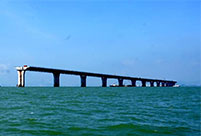

 |
Chinese economy increasingly open, inclusive: economist
The US-led Trans-Pacific Partnership (TPP) trade agreement will not isolate China or seriously hurt the Chinese economy, experts said Wednesday, adding it could lead the world's second-largest economy to reach similar deals with other nations, after a deal was reached on the TPP earlier this week.
Amid widespread online pessimism over the trade pact among 12 Pacific Rim nations that some believe deliberately excluded China, Chinese economists said such anxieties have been overblown.
Huang Wei, director of the Institute of World Economics and Politics at the Chinese Academy of Social Sciences, said the TPP will affect China, but will have a "minimal negative impact" on the Chinese economy in the long run because of the economy's size and its irreplaceable role in regional and global markets.
Huang believes the TPP creates more of a "psychological effect" on China that the country has been left out by its neighbors and trading partners from such a significant trade agreement. "But don't turn pale just at the mention of a tiger," she told the Global Times on Wednesday.
She said, if anything, the trade accord will push China to further engage with regional and global economies and pursue more trade agreements with countries in Asia and around the world, which will help the Chinese economy grow and better compete globally.
Chen Fengying, an expert at the Institute of World Economics Studies under the China Institute of Contemporary International Relations, also believes that the TPP will not isolate China from the regional economy and could even be beneficial.
"Given the important role China plays in regional and global economics, a single agreement won't isolate China," Chen told the Global Times Wednesday. She added that if the TPP can help build a more open and prosperous Asia, it will be conducive for the Chinese economy.
Both Huang and Chen's comments come after trade ministers from the US, Canada, Mexico, Chile, Peru, Japan, Malaysia, Vietnam, Singapore, Brunei, Australia, and New Zealand reached a deal.
After days of negotiations on the details of the deal in Atlanta, US officials announced Monday that an agreement had been reached, ending years of talks, though the deal still needs to go through the legislative process of each country before it can be signed and implemented.
Prevailing issues
Some posts on popular social media platforms in China suggested Wednesday that China's own issues in areas such as intellectual property protection, environmental standards and currency policies prevented it from being included in the deal, while others said the US is trying to single out China and counter China because the US feels its economic and political dominance is being threatened.
Experts said understanding the TPP's impact should not only be based on the "US conspiracy theory" or the "China-deserves-it" angle.
Zhang Jianping, a foreign trade expert at the National Development and Reform Commission, told the Economic Daily that China lags behind in meeting the TPP's requirements, such as environmental, finance and labor standards. It will take a long time for China to reach those standards, and that is why China held back in joining the TPP, he said.
Chen also said that intellectual property protection, environmental standards and other factors might have been reasons why China did not sit at the negotiating table, but such a move has pushed China to improve in such areas, as it holds numerous trade talks with countries in Asia and beyond, including TPP member-nations.
China engages world
China has reached separate free trade agreements with Australia, New Zealand, Chile, Peru, and Singapore, who are also involved in the TPP, while continuing talks with the US, Japan and other countries on free-trade deals.
China is also engaged in regional multilateral trade talks, such as the Free-Trade Area of the Asia-Pacific (FTAAP) with Asia-Pacific Economic Cooperation (APEC) economies, and the Regional Comprehensive Economic Partnership (RCEP) with the Association of Southeast Asian Nations (ASEAN) and Japan, South Korea, Australia, New Zealand and Indonesia.
All these efforts and other projects such as the "Belt and Road" initiative and the Asia Infrastructure Investment Bank (AIIB) show the Chinese economy is moving toward being more open and inclusive, Chen said. It will help the country to maintain its increasing influence over regional and global trade, she added.
Chen also said she believes these trade deals are not mutually exclusive, saying they can complement each other by building a more open and fair regional economy in the Asia-Pacific.
China's Ministry of Commerce said Tuesday that China is open to any trade agreement "compatible" with rules established by the World Trade Organization, and that is conducive to the regional economic integration of the Asia-Pacific region.
 Top 10 nominated designs at BJDW
Top 10 nominated designs at BJDW Fashion show staged in Forbidden City at night
Fashion show staged in Forbidden City at night Construction of HK-Zhuhai-Macao Bridge enters final stage
Construction of HK-Zhuhai-Macao Bridge enters final stage Model of heavy-lift copter makes debuts at Tianjin expo
Model of heavy-lift copter makes debuts at Tianjin expo Art photos of Chinese beauty in Han Chinese clothing
Art photos of Chinese beauty in Han Chinese clothing Stunning photos of air show in China’s V-Day parade
Stunning photos of air show in China’s V-Day parade Models change clothes on street in Hangzhou
Models change clothes on street in Hangzhou Charming Chinese female soldiers
Charming Chinese female soldiers Beauty vs. muscular man
Beauty vs. muscular man You can’t go home again
You can’t go home again Nobel Prize win sparks academic selection debate
Nobel Prize win sparks academic selection debate Frozen embryos in limbo
Frozen embryos in limbo Ex-paratrooper takes vertigo-inducing photos of China’s cities from above
Ex-paratrooper takes vertigo-inducing photos of China’s cities from aboveDay|Week